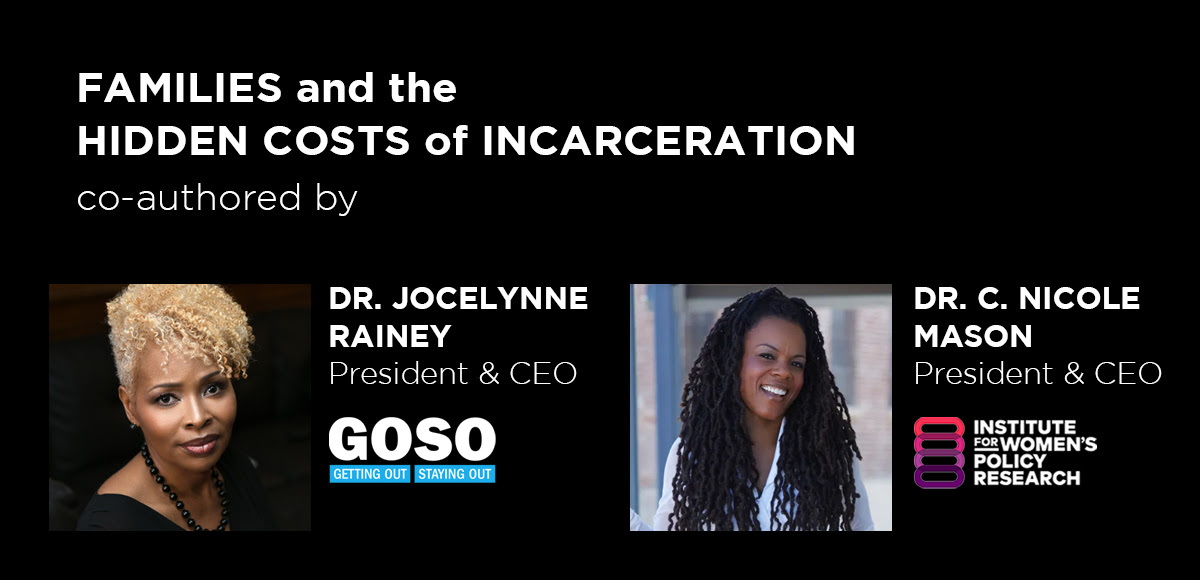FAMILIES AND THE HIDDEN COSTS OF INCARCERATION
Authors: Dr. Jocelynne Rainey, CEO, Getting Out and Staying Out (GOSO); Dr. C. Nicole Mason, CEO of the Institute for Women’s Policy Research
February 16, 2021
Black History Month feels different this year. Among the many conversations we’re having about the contributions that African Americans have made to this nation, through our work we’re also deeply aware of the systemic oppression that continues to keep young Black and Latinx men ensnared in the criminal justice system. And one issue that gets neglected far too often is the lasting impact incarceration leaves on families.
When a young man becomes involved with the criminal justice system, he’s rarely there alone. Parents, extended family members, and loved ones are all psychologically locked behind bars as well—collectively experiencing the trauma of incarceration. Newspaper headlines routinely report on young men getting arrested, but the stories rarely touch on the invisible victims who bear the emotional and psychological scars from having their loved one’s life hang in the balance. And because young Black and Latinx men are disproportionately impacted by our criminal justice system, the net result is that entire communities like East Harlem experience the trauma.
The intersection of families and criminal justice reform
The work done by the Institute for Women’s Policy Research is instrumental in shaping policies that grow women’s power and influence, close inequality gaps, and improve the economic well-being of families. Meanwhile, GOSO—Getting Out, Staying Out, is a Harlem-based nonprofit helping justice-involved young men find jobs, housing, and stability. Through our respective work, our teams stand on the frontlines of criminal justice reform, where we’re seeing how misguided policies are keeping people below the poverty line.
When men enter a correctional facility, the burden of taking care of the family often falls on women—while children are expected to be resilient creatures who will somehow adapt. We have to remember, however, that when a parent enters a correctional facility—often for nonviolent offenses—the knock-on-effects include the increased likelihood of single-parent households, fractured families, and childhood poverty.
Rain does not fall on one roof alone
By some estimates, more than 5 million children in America have at least one parent in prison, often for non-violent offenses. In New York alone, more 100,000 children around the state go to sleep each night having at least one parent in prison, often in facilities several hours away from families that provide an essential support system.
We are encouraged that New York state legislators recently enacted a law requiring that incarcerated parents be housed in prisons closest to the homes of their children, and we hope other states follow suit. But this long-overdue policy change won’t erase the trauma, pain, and stigma that comes from having a parent in the criminal justice system, even if they haven’t been convicted of a crime.
Parental incarceration creates trauma that lasts for generations. Let’s consider for one moment how divorce and the dissolution of a family can harm children. By some estimates, boys raised without a father present are over two times as likely to enter the criminal justice system compared to boys with a father present; and 70% of incarcerated adults come from single-parent homes.
The high cost of incarceration
There’s no overstating the extent to which financial pressures adds to the yoke that families of the incarcerated bear. The average bail for felonies is $10,000, which is well outside the reach of most people, never mind individuals working in lower-paying jobs.
What’s more, a study by the New York City Criminal Justice Agency found that approximately 40% of defendants held on bail are employed, with average weekly earnings of $400, translating to $20,800 per year. This means that New York City loses about $28 million in wages every year due to pre-trial incarceration. Privatized services within jails, such as phone calls and commissary, further add to the costs of incarceration for families.
We need a dynamic alternative to mass incarceration
The most glaring problem that we face as a society and a nation is the use of mass incarceration as the solution to every social malady we face. But every problem doesn’t look like a nail, and every solution isn’t a hammer. Racism, drug addiction, mental health issues, and learning disabilities are just the tip of the iceberg when it comes to problems used to criminalize Black and brown people. For decades, this country has poured millions of dollars into maintaining a highly bureaucratic criminal justice system that prioritizes punishment for nonviolent crimes and technical violations of the law over keeping families intact. As the dominos continue to fall, incarceration destroys family wealth, increases debt, and makes it exceedingly difficult to find a meaningful job.
Instead, we need more dynamic solutions that treat the right problem with the right solution. Let’s stop incarcerating people living with mental illness. Our teachers need more support as they continue the very important work of identifying and helping children with learning disabilities. Can we finally dismantle the school to prison pipeline? And let’s recognize drug addiction in inner cities for what it is—a tragic illness. The Rev. Dr. Martin Luther King Jr. reminded us, “We are caught in an inescapable network of mutuality, tied in a single garment of destiny. Whatever affects one directly, affects all indirectly.”
As we continue working on the front lines of criminal justice reform and improving outcomes for families touched by incarceration, we want to stress the importance of recognizing that incarcerated individuals are more than a number. Despite their justice involvement, we need to reverse once and for all the inhumane policies of mass incarceration that destroy Black families. We owe it to each other to do better.
Dr. Jocelynne Rainey, GOSO President & CEO, Dr. C. Nicole Mason, IWPR President & CEO

